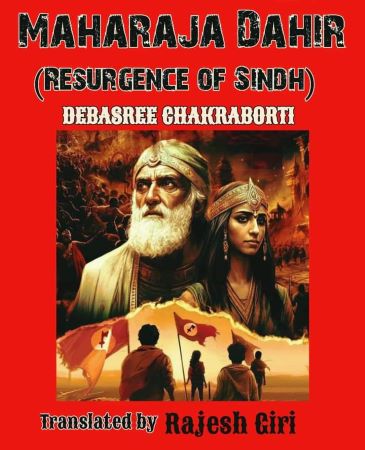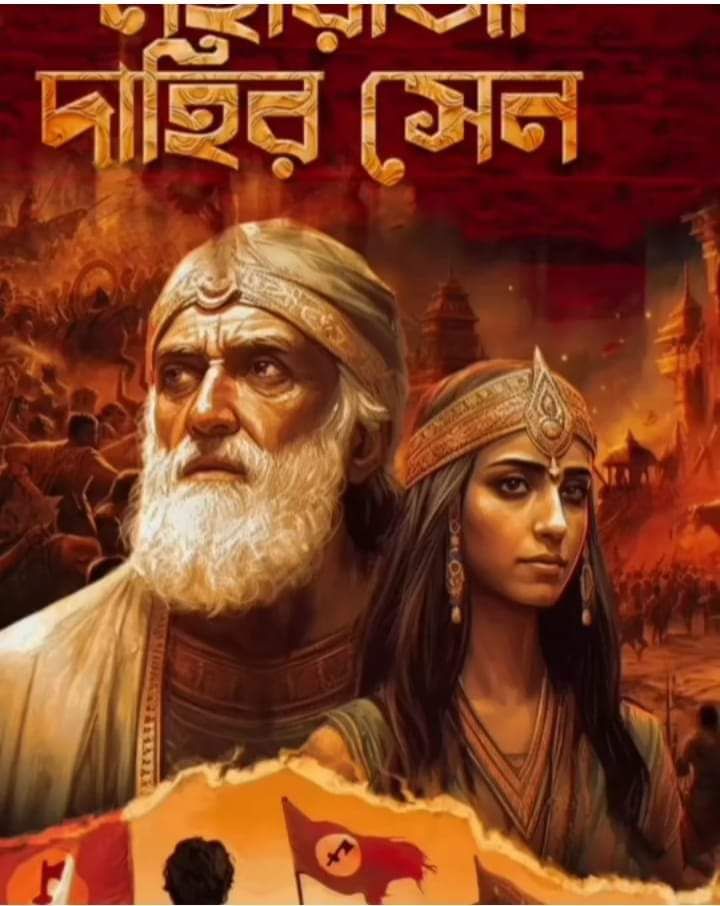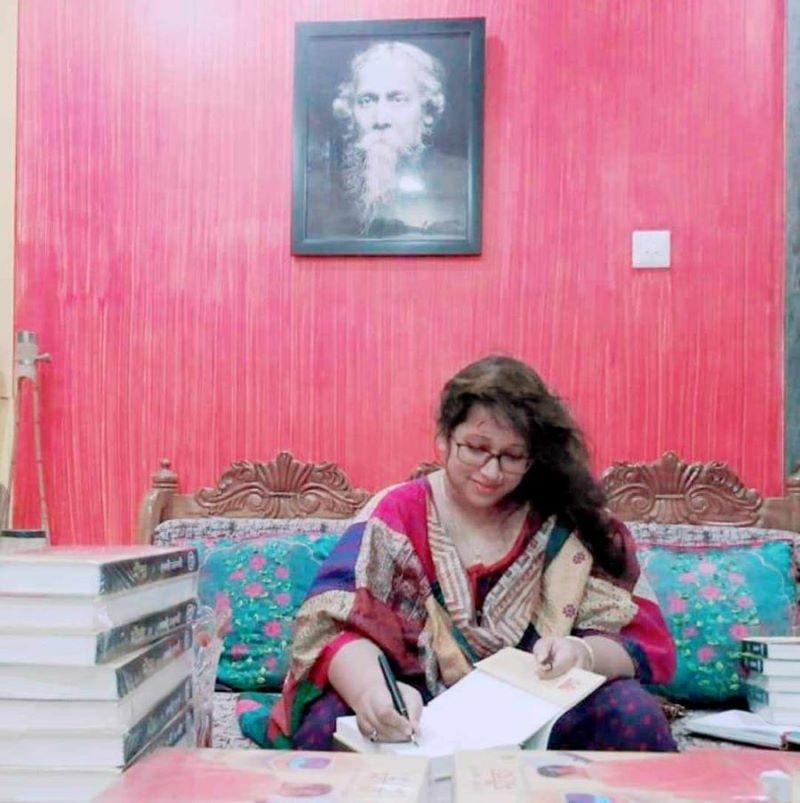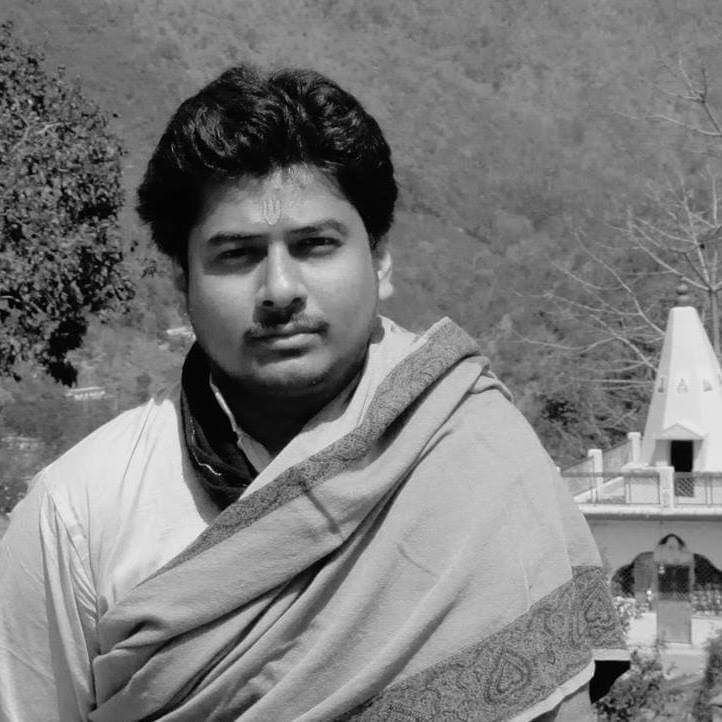
The English translation of a novel ‘Maharaja Dahir’ authored by Kolkata-based renowned novelist Debasree Chakraborti in Bengali language. The novel has been translated by Rajesh Giri
Place- Kikan, Sindhu Desh
Time- From 660 AD to 680 AD.
On full moon night, the distant mountains look like desert-monsters, today the moon in the sky seems like a big fireball approaching towards to consume Kikan. Right now evening vesper and worship is processing at the Shiva temple in the middle of the city, strong gusts of wind drawing jarring sound is approaching from the vast stretch of distant desert.
The intense rhythm of the temple bells combining with the rumbling the desert wind resonates like battle roar. A few camels sitting outside the houses by the side of the highway screaming in every now and then.
At the end of this city is Pratap’s house, an old woman is lying on a cot in the middle of the large yard of this house, at the feet of the old woman there is a huge peepal tree, by the side of which a staircase goes up to the second floor. The peepal leaves have been scattered all around by the desert blow. The old woman lying down, babbles incessantly like a delirium, but there is no one to answer her words.

Once the old woman got impatient and sat up and shouted, “Hey lady, be ashamed of yourself, Pratap told you not to come out of the house, and you are standing on the roof!”
The woman kept panting because of the continuous talking, she is old, and now she does not have the strength of her body as before. But her strength of mind did not diminish at all, he stood up leaning on her stick and walked towards the stairs. When the old woman is climbing the stairs, then on the second floor, a yellow scarf is fluttering in the wind.
Sheetal, Pratap’s wife, staring out of the corner of her veil at the far away mountain pass.
The far off desert is clearly visible in the moonlight. Sheetal looked at the moon in the cold sky and expressed his displeasure.
Debasree Chakraborti introduces her book ‘Maharaja Dahir’
No need for so much light tonight! She was observing the movement of a certain sound, she didn’t have to wait too long, a loud noise rushed through the narrow pass like a dense cloud of dust and mingled in the vast desert, it was clearly visible in the light of the full moon, hundreds of horses spread around the desert, the approaching strangers are not clearly visible, but they are rushing closer with ‘Allah-hu-Akbar’ noise. This unfamiliar sound continued to echo all around like a dreadful battle drums.
Suddenly Sheetal was startled by the touch of a cold palm on her back and saw her mother in law standing there. Her old mother-in-law, still sighted, was also speechless looking at the desert, by the moment ‘Har Har Mahadev’ sounded from all around the desert.

The Kikan region is surrounded by rugged mountains, called the Kikanan, inhabited by the pastoralist tribal communities. The men of this tribal community take their cattle to the green pastures on the banks of the river beyond this pass in the early morning, from there throughout the day they return to their villages at night. One afternoon two days ago, an old man arrived in the city from the herdsmen’s village. The news reached the Nagarpala through the messenger of the gatekeeper of the city. The gatekeeper informs the messenger that the tribal elder has said he must meet the Nagarpal (mayor) by this evening, or the destruction of the city is imminent. Usually the mayor does not meet the common people. But hearing this news from the messenger, he asked to bring the old man. As the old man enters the palace building, the western sky turns crimson. At this moment of sunset the western mountain range resembles like a burning volcano. Nagarpal, standing on the roof of his building, is enjoying the sunset.
“We will not let our motherland be desecrated by anyone; today to protect the honor of our mother, even this life is insignificant, we will protect Kikan with every drop of our blood. Har Har Mahadev…”
At that time, he turns back upon hearing the elderly man’s address and sees an indigenous old man standing with folded hands, in the tired and cloudy eyes of the man, the rays of the sun get reflected, assuming a blood-red hue, and amidst of the copper tan his skin appears like the rugged cliffs and canyon of kikan. The city mayor is visibly struck with an inexplicable dread in the elder’s eyes and face. He places a hand on the elder’s shoulder and says, ‘Speak fearlessly whatever you’ve come to say.’
The old man said, “Like every day, today at early morning the youths of our village went to the grazing land on the banks of the Kinri River. When they got there, they saw thousands of black tents across the river. Outside the tents, hundreds of thousands of soldiers are waiting across the vast territory. The stinking odour of these black-clad soldiers has reached the other side of the river. Our lambs often cross the little water of the dried river bed and go to other side.
Around noon time they killed some of our young men and took all the animals across the river. Ramu of our village somehow managed to escape and return with this news. Listening to Ramu’s words it is anticipated that those have an uncanny similarities with the Arabian merchants.

That evening, when a black horse came running towards the city through the gorge, the old man was returning to his village through the outskirts of the city. Seeing the stranger, he started running back towards the city out of fear, but the stranger severed the old man’s head from his body with his own sword onslaught like storm. The headless body of the old man falls on the ground and convoluting severely and after some time become motionless. The soil of Kikan get stained with the blood his body.
The gatekeeper of the city seeing this terrible scene from a distance, alerted his fellows. They keep waiting for the right time. Then when the stranger get nearer to the city gate, a swarm of arrows came and pierced him. This incident spread across the city like blow of wind.
This city is inhabited by the Jat community, the Jats think of themselves as an integral family, this city is synonymous to their family, and they will do anything to protect it. On hearing the news, all the Jat men of the city come together and run to the outer stretch of the city. The stranger was still alive a little. All bent upon him, the poor dying man still harboured a terrible hatred for them, which he expressed by spitting on them and uttered in his mother tongue, of which he used the word ‘kafer’ (infidel) the most.
Pratap, the leader of the new generation of Jatts, watched the stranger for a long time, at one point when he brought his face in front of him, the stranger spat on his face, and immediately was stabbed by Pratap on the left side of his chest.
They are several thousands in number, so arrows must be fired like storm from both sides of the pass, so that half of them are exterminated before they enter into the stretch of desert.
That night the old man’s body was cremated in his village. Then the Jaths and the tribal of the city sat under a peepal tree in the village and started planning the battle. While everyone was discussing among themselves, Pratap arrived at the village on horseback. He threw the body of the enemy across the river. A strong odor was emanating from Pratap’s body, his white clothes were stained with blood. An elderly Jat man said pointing Pratap, “Pratap, have they seen you?”
Pratap sat on a rock at some distance and said, “I don’t get down from the horse, riding on I threw the body across the river and left”.
The old man said, “I think some message was sent through him.”
Pratap took out a piece of cloth from inside his clothes and said,” I found it in his clothes, I think there is some message in it.”
One of them said, “I use to go to Arab countries to do business, I can learn their language.”
Pratap said, ‘you were not there then, the man was repeatedly addressing us as ‘kafir’. What does ‘kafer’ mean?”
The man said, “Those who do not believe in Allah, those who are idolaters, they address them as ‘kafir’. Give it to me, let me see what is written here.”
Pratap handed over the piece of cloth to the man.
Ramu, a young tribal man, held the light of a torch to the cloth, and as the man opened it, some letters in Arabic within it glowed in the light of the torch. Written in black ink on white cloth.
The man read the letter and sat in silence for a while, while everyone looked at his face and waited for an answer. He remained silent for a while and said, “They warned us to surrender, and if we don’t then…!”
Pratap got excited and said, “What would they do if we don’t surrender?”
—”If we don’t surrender, they will drench the soil of Kikan with blood, plunder our daughters-our honor and wealth,” all these are written.
Ramu said, “They won’t get that chance to bleed, we will finish them before.”
The person who was reading the letter said, “A few days ago a person came from Arabia to Sindh with me. He was saying that the Khalifa had sent him. When I asked him why the Caliph had sent him, he replied that the Caliph wanted to spread the business of the Arab traders further in the Sindh, so he was gathering information about the nature and the people. The man’s speech and demeanour were so calm and mellow that no doubts aroused in my mind about him. Now we can see that he came here to do spying.”
Review of the novel ‘Maharaja Dahir’ in Bengali language
Pratap said, “We don’t have much time in hand, when they find the dead body, they will understand our response. Then the attack will begin. Before entering the city of Kikan, they will attack through the vast desert, the pass that is the entrance to the desert. Our Jaath soldiers will be there at the mouth of and around the canyon hiding themselves in the thorny bushes around the desert. To blend in with the land, we must wear saffron clothes resembles to the land. Ramu, along with all the tribal Young men, you will hide in the corners of that pass with your bows and arrows ready, you too must wear the saffron color clothes, so that you can blend in the mountains. They are several thousands in number, so arrows must be fired like storm from both sides of the pass, so that half of them are exterminated before they enter into the stretch of desert, and the rest we the jaaths will handle. We all wear saffron clads while worshipping Mahadeva, putting on that we will enter into the battle.”
Pratap stood up and clinched both of his fists, now his eyes are looking terrible. Pratap said, “We will not let our motherland be desecrated by anyone; today to protect the honor of our mother, even this life is insignificant, we will protect Kikan with every drop of our blood. Har Har Mahadev…”
Hearing the words of Pratap, the Jath warriors unitedly raised “Har har Mahadev”. And all the natives including Ramu hailed “Jai Maa Bhavani”.
The person who was reading the letter saw that at the bottom of the letter it was written, ‘Harish ibn Murrah, the Arab commander.’ (Continues)
_________________
Great
Great write up.
تمام بهترين ڪتاب مڪمل ڪتاب جو انتظار رهندو
We are waiting for this Book beacuseoff this book related to our mother land Sindh and Ruler of Sind Maha Raja raja Dahar
[…] here for Part-I , […]
Really this is good news for us that book is translating in English 🥰
Please send this book in pdf
[…] here for Part-I , Part-II, […]
[…] here for Part-I , Part-II, Part-III , […]
[…] here for Part-I , Part-II, Part-III , Part-IV , […]
[…] here for Part-I , Part-II, Part-III , Part-IV , Part-V , […]
[…] here for Part-I , Part-II, Part-III , Part-IV , Part-V , Part-VI , […]
This seems to be great book. It happens to be the forgotten history. Sindh is no one’s child. In Pakistan Sindhi culture is being discarded. In India the younger generation doesn’t care.
But, his attempt from a Bengali to resurrect Sindh is commendable. I would love to purchase this book as a hardcopy or in Pdf format. In my library I have CHACH.NAMA. But it is rather different.
My compliments for bringing History of Sindh before the people of India.
[…] here for Part-I , Part-II, Part-III , Part-IV , Part-V , Part-VI , Part-VII, […]
[…] here for Part-I , Part-II, Part-III , Part-IV , Part-V , Part-VI , Part-VII, Part-VIII , […]
[…] here for Part-I , Part-II, Part-III , Part-IV , Part-V , Part-VI , Part-VII, Part-VIII , Part-IX , […]
[…] here for Part-I , Part-II, Part-III , Part-IV , Part-V , Part-VI , Part-VII, Part-VIII , Part-IX , […]
[…] here for Part-I , Part-II, Part-III , Part-IV , Part-V , Part-VI , Part-VII, Part-VIII , Part-IX , […]
[…] here for Part-I , Part-II, Part-III , Part-IV , Part-V , Part-VI , Part-VII, Part-VIII , Part-IX , […]